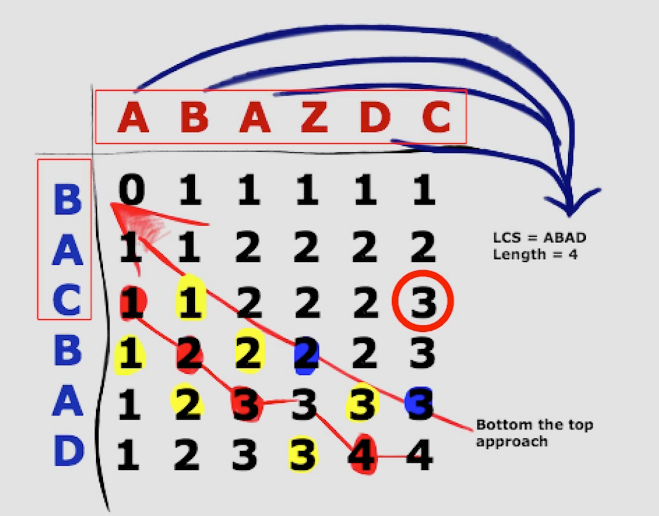官方链接
https://leetcode-cn.com/problems/longest-common-subsequence
给定两个字符串 text1 和 text2,返回这两个字符串的最长公共子序列。
一个字符串的 子序列 是指这样一个新的字符串:它是由原字符串在不改变字符的相对顺序的情况下删除某些字符(也可以不删除任何字符)后组成的新字符串。 例如,"ace" 是 "abcde" 的子序列,但 "aec" 不是 "abcde" 的子序列。两个字符串的「公共子序列」是这两个字符串所共同拥有的子序列。
若这两个字符串没有公共子序列,则返回 0。
示例 1:
输入:text1 = "abcde", text2 = "ace"
输出:3
解释:最长公共子序列是 "ace",它的长度为 3。示例 2:
输入:text1 = "abc", text2 = "abc"
输出:3
解释:最长公共子序列是 "abc",它的长度为 3。示例 3:
输入:text1 = "abc", text2 = "def"
输出:0
解释:两个字符串没有公共子序列,返回 0。提示:
1 <= text1.length <= 1000
1 <= text2.length <= 1000
输入的字符串只含有小写英文字符。思路
暴力解法
递归生成 text1的所有子序列(取/不取每个元素,O(2^n))
DP

DP 方程
if S1[-1] != S2[-1]:
LCS[s1, s2] = Max(LCS[s1-1, s2],LCS[s1, s2-1])
if S1[-1] == S2[-1]:
LCS[s1,s2] = LCS[s1-1,s2-1] + 1
# LCS 指 最长公共子序列的首字母
高级字符串算法
最长子串、子序列
- Longest common sequence(最长子序列)
https://leetcode-cn.com/problems/longest-common-subsequence/
dp[i][j] = dp[i-1][j-1] + 1 (if s1[i-1] == s2[j-1]) else dp[i][j] = max(dp[i-1][j], dp[i][j-1])
- Longest common substring (最长子串)
dp[i][j] = dp[i-1][j-1] + 1 (if s1[i-1] == s2[j-1]) else dp[i][j] = 0
解法一
class Solution:
def longestCommonSubsequence(self, text1: str, text2: str) -> int:
if not text1 or not text2:
return 0
m = len(text1)
n = len(text2)
dp = [[0]*(n+1) for _ in range(m+1)]
for i in range(1, m+1):
for j in range(1, n+1):
if text1[i-1] == text2[j-1]:
dp[i][j] = 1+ dp[i-1][j-1]
else:
dp[i][j] = max(dp[i-1][j], dp[i][j-1])
return dp[m][n]
class Solution {
public int longestCommonSubsequence(String text1, String text2) {
int m = text1.length(), n = text2.length();
if (m == 0 || n == 0) return 0;
int[][] dp = new int[m + 1][n + 1];
for (int i = 1; i < m + 1; i++) {
for (int j = 1; j < n + 1; j++) {
if (text1.charAt(i - 1) == text2.charAt(j - 1)) {
dp[i][j] = dp[i - 1][j - 1] + 1;
} else {
dp[i][j] = Math.max(dp[i - 1][j], dp[i][j - 1]);
}
}
}
return dp[m][n];
}
}